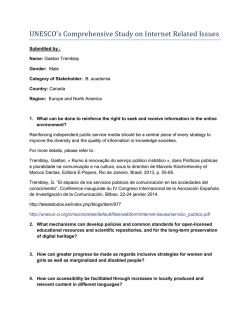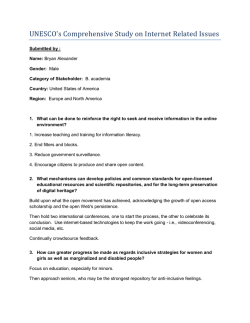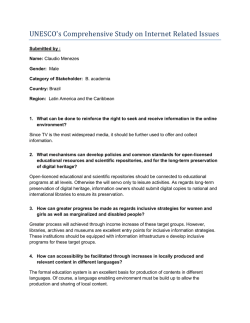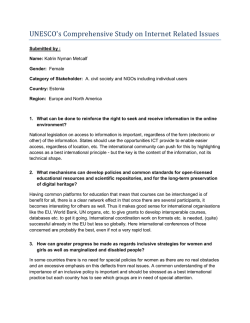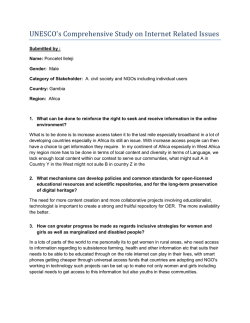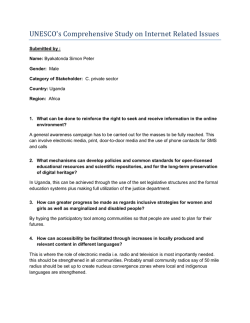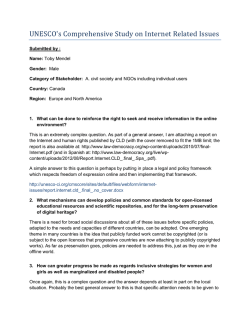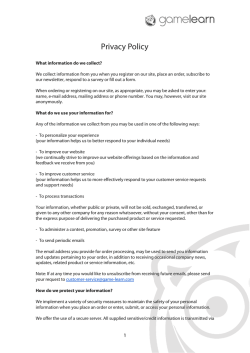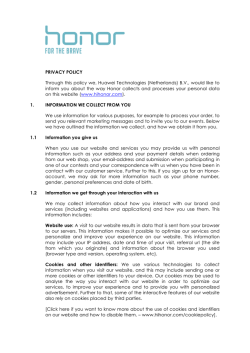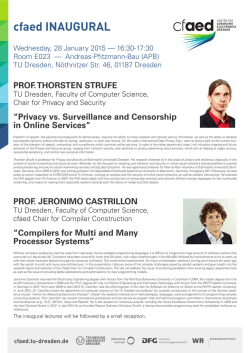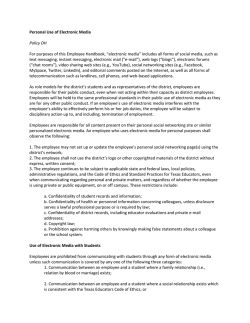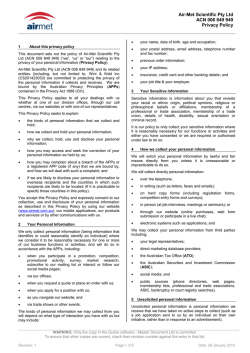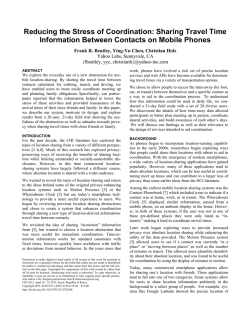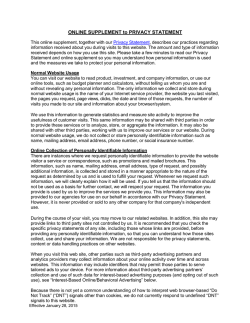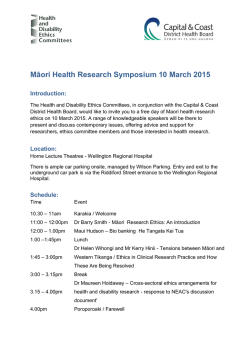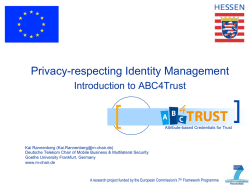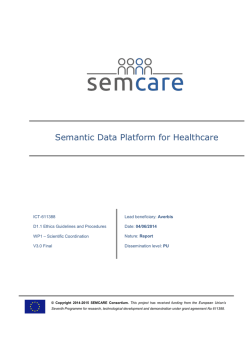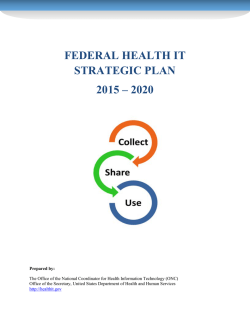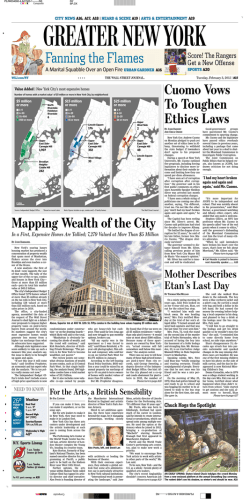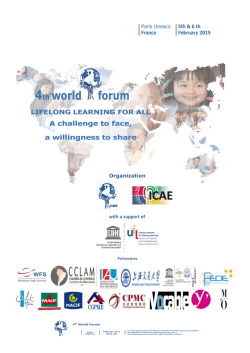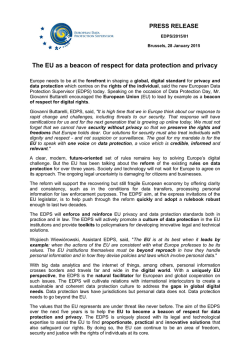
Rafael Capurro, Prof. em. Dr.
UNESCO's Comprehensive Study on Internet Related Issues Submitted by : Name: Rafael Capurro, Prof. em. Dr. Gender: Male Category of Stakeholder: B. academia Country: Germany Region: Europe and North America 1. What can be done to reinforce the right to seek and receive information in the online environment? Support academic research on this issue in each country and organized multistakeholder meetings, nationally and internationally. See http://www.capurro.de/wsis2010_africa_infoethics.html 2. What mechanisms can develop policies and common standards for open-licensed educational resources and scientific repositories, and for the long-term preservation of digital heritage? install courses at local universities and research centers so that they can develop local solutions to local problems 3. How can greater progress be made as regards inclusive strategies for women and girls as well as marginalized and disabled people? organize academic and multistakeholder national and international conferences on these issues 4. How can accessibility be facilitated through increases in locally produced and relevant content in different languages? start with projects at local universities and research centers 5. What can be done to institutionalize Media and Information Literacy (MIL) effectively in national educational systems? organize meetings so that one educational system in one area can learn from others 6. What are the current and emerging challenges relevant to freedom of expression online? mutual isolation and disrespect towards each other 7. How can legislation in a diverse range of fields which impacts on the Internet respect freedom of expression in line with international standards? organize academic meetings so that comparative studies can be presented and discussed 8. Is there a need for specific protections for freedom of expression for the Internet? this is different according to cultural standards and customs. This is why we need an intercutural dialogue or what I call Intercultural Information Ethics See: http://www.capurro.de/iiebangkok.html 9. To what extent do laws protect digitally interfaced journalism and journalistic sources? to the extent in which such protection is allowed by local legislation 10. What are the optimum ways to deal with online hate speech? How can Media and Information Literacy empower users to understand and exercise freedom of expression on the Internet? again, we need a broad(er) academic and multistakeholder exchange on these issues. 11. What are the optimum systems for independent self-regulation by journalistic actors and intermediaries in cyberspace? I am happy if we have a system of fair play that is not optimum but practically useful 12. What principles should ensure respect for the right to privacy? Basically the principle of mutual respect and fair play. See this report http://www.acatech.de/fileadmin/user_upload/Baumstruktur_nach_Website/Acatech/root/de/Pub likationen/Projektberichte/acatech_STUDIE_Internet_Privacy_WEB.pdf and Rafael Capurro, Michael Eldred and Daniel Nagel: Digital Whoness: Identity, Privacy and Freedom in the Cyberworld. Frankfurt 2013. 13. What is the relationship between privacy, anonymity and encryption? if we understand privacy as the possibility of revealing and concealing who we (as individual or as a group or as a society...) are, then the freedom of do it anonymously is an important issue, but, as every human value, nont aboslute. Encryption is related to reifications of who we are. It concerns data (or 'what' we are) and it can be useful to protect both, the who and the what. On the relation between privacy and secrecy, see http://www.capurro.de/secreto.html 14. What is the importance of transparency around limitations of privacy? Transparency and privacy or the possibility of revealing and concealing who we are is at the core of the human interplay. Limitations of privacy are no less important than limitations of transparency. The rules of this interplay are not fixed once and for ever (and for all) but must by analyzed academically and politically again and again. 15. What kinds of arrangements can help to safeguard the exercise of privacy in relation to other rights? local or national arrangements are important but also international and intercultural discussions. 16. How can openness and transparency of data be reconciled with privacy? there is no 'final' reconciliation. See my answer to 14. 17. What may be the impact of issues relating to big data on respect for privacy? it can lead to a global surveillance society as well as to all kinds of misuses of such data that must not be ilegal but that can create an atmosphere of disrespect and mistrust. Monopolies can work as if this were not the case. But the opposite is also possible: big data can be used to facilitate life, create new services, etc. 18. How can security of personal data be enhanced? by rising the awareness of people (starting in schools) about the dangers and the kinds of technical possibilites to protect such data and, above all, by explaining young (and old) people that this is not just a question of data (i.e. of reifications of their identities) but of the interplay in the physical world. 19. How can Media and Information Literacy be developed to assist individuals to protect their privacy? by education at schools as well as by curricula development at local universities that promote then social discussions. See the activities of the African Centre of Excellence for Information Ethics at the University of Pretoria http://web.up.ac.za/default 20. How can ethical principles based on international human rights advance accessibility, openness, and multi-stakeholder participation on the Internet? Ethical principles need interpretation in order to be unterstood and applied in local environment. A purely reference to them as 'universal' remains abstract and without practical impact. It is as having a law but without academic research on legal issues, and without discussions in parliament and in the media and without practical application by legal bodies particularly courts of justice. But ethical principles are not of the same kind as laws. They concern the realm of self-understanding of human individuals and societies and refer not only to the contingency of such self-understanding but also to the possibilites of shaping our lives individually and as a society in different ways. This is then an issue of freedom and less of imposing a law with sanctions etc. Human rights might be part of local legislation but they are then subject to different kinds of understanding and of application as different rights might collide with each other, locally and globally. A purely reference to 'the human rights' remains abstract without theoretical and practical analysis and application. Human rights are also 'just' human rights, that is they should be extended to other 'rights' concerning non-human living beings, the environment etc. The list of such rights is open-ended and depends on historical developments. This is the case with the advent of the internet as it was with the invention of the printing press. 21. What conceptual frameworks or processes of inquiry could serve to analyse, assess, and thereby inform the choices that confront stakeholders in the new social uses and applications of information and knowledge? See my answer to question 22 22. How does ethical consideration relate to gender dimensions of the Internet? Gender dimensions are deeply rooted in cultural traditions. We need in this field an intercultural academic debate no less than a political one. 23. How can ethics, - i.e. the simultaneous affirmation of human rights, peace, equity, and justice - inform law and regulation about the Internet? I understand by 'ethics' not just the 'affirmation' of human rights, equite and justice' which is the real of morality and law. Ethics as an academic discipline is a permanent questioning or problematization of such rights and regulations. It is part of philosophy and as such a never- ending process of discussion and understanding. To identify ethics or moral philosophy with a code of morality (!) or with a given legislation is like identify the economy with economics or health with medicine or buildings with architectural research etc. So, ethics, as an academic disipline can help to clarify or enlighten such issues concerning human rights, peace, equity and justice and so let possibilites open either for changing a given (explicit or implict) system of customs and laws or by suggesting new forms of human fair interplay 24. What international, regional and national frameworks, normative guidelines and accountability mechanisms exist of relevance to one or more fields of the study? See for instance the Tshwane Declaration on IE in Africa http://www.africainfoethics.org/tshwanedeclaration.html as well as the open access books on IE in Africa http://www.africainfoethics.org/open_access.html 25. How do cross-jurisdictional issues operate with regard to freedom of expression and privacy? I have no experience about this issue 26. What are the intersections between the fields of study: for example, between access and freedom of expression; ethics and privacy; privacy and freedom of expression; and between all four elements? I have already answered this question See also my paper: Shapes of Freedom in the Digital Age http://www.capurro.de/kastamonu.html 27. What pertinent information materials exist that cut across or which are relevant to the four fields of the study? See as an example my answer tu question 24 28. What might be the options for role of UNESCO within the wider UN system in regard to the distinct issues of online Access to information and knowledge, Freedom of Expression, Privacy and Ethical dimensions of the information society? so support academic and multistakeholder events (conferences, meetings, workshops etc.) at local or national level as well as internationally and interculturally. 29. What might be options for the role of UNESCO in relation to stakeholders outside the UN system? coopration between academic partners for 30. For each study field, what specific options might UNESCO Member States consider? Support academic research on the basis of cooperation between Member States as well as organizing international/intercultural conferences on issues dealing with Information Ethics.
© Copyright 2026
